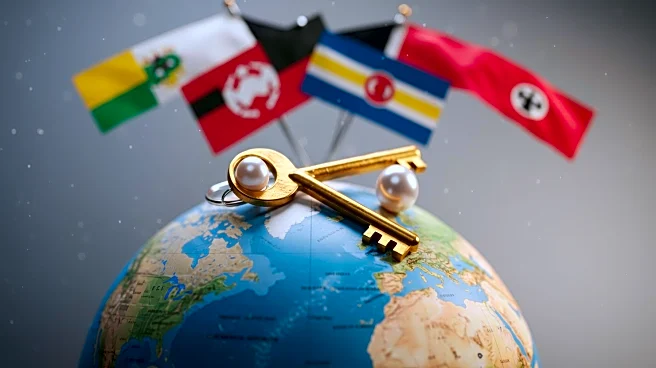What's Happening?
Israeli Ambassador to Bahrain, Eitan Na'eh, is concluding his tenure after four years, marking significant diplomatic achievements under the Abraham Accords. These accords, signed in 2020, facilitated unprecedented diplomatic relations between Israel and Bahrain. Na'eh's tenure included navigating the COVID-19 pandemic and regional conflicts, yet he maintained high-level dialogues and strengthened bilateral ties. His farewell meeting with Bahrain's Prime Minister and Crown Prince Salman bin Hamad Al Khalifa was publicly acknowledged, indicating Bahrain's openness to its relationship with Israel. Na'eh highlighted the importance of maintaining dialogue and the courage shown by Bahraini leaders in addressing regional issues, such as condemning Hamas and advocating for the release of hostages.
Why It's Important?
The diplomatic relationship between Israel and Bahrain, fostered by the Abraham Accords, represents a significant shift in Middle Eastern geopolitics. This relationship has led to substantial economic growth, with trade between the two nations increasing dramatically. In 2023, Israel's exports to Bahrain reached $5.65 million, while Bahrain's exports to Israel were $16.5 million. The accords have facilitated not only economic exchanges but also cultural and political dialogues, contributing to regional stability. The continued dialogue and cooperation between Israel and Bahrain could serve as a model for other nations in the region, potentially expanding the accords to include more countries and fostering broader peace and prosperity.
What's Next?
As Ambassador Na'eh returns to Israel, his successor, Ambassador Sammy Ravel, will continue to build on the established diplomatic foundations. The future of Israel-Bahrain relations will likely focus on further economic collaboration and addressing ongoing regional challenges, such as the humanitarian situation in Gaza. The potential expansion of the Abraham Accords to include more countries remains a possibility, contingent on regional developments and diplomatic efforts. The continued advocacy for the return of hostages and the resolution of conflicts in Gaza will be critical in shaping the future dynamics of these relations.
Beyond the Headlines
The Abraham Accords have not only facilitated diplomatic and economic exchanges but have also fostered cultural understanding and cooperation. The relationship between Israel and Bahrain exemplifies how peace agreements can transcend political boundaries and lead to mutual benefits. The accords challenge traditional geopolitical alignments and encourage new partnerships, potentially reshaping the cultural and political landscape of the Middle East. The emphasis on dialogue and mutual respect highlights the importance of diplomacy in resolving conflicts and promoting regional stability.











